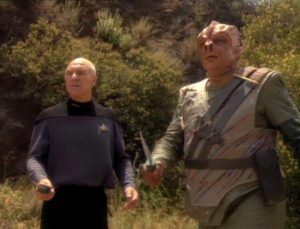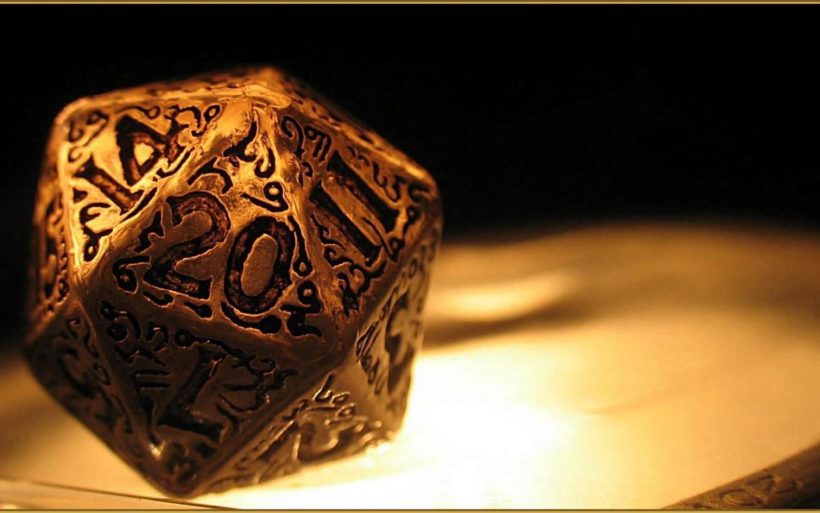Commodore Tank Clark, SFMD
First Officer & Helmsman, USS Regulator NCC-2009
OIC 333rd Marine Strike Group, “Phoenix Squadron”
TL, 33rd STARFLEET Rangers, “The Paladins”
3BDE S1 (Personnel and Administration Officer)
As many of us do from time to time, I was re-watching an episode of Star Trek the other day. Specifically, the episode was “Darmok,” the second episode of the fifth season of Star Trek: The Next Generation. The first time I saw this episode, I remember thinking “what the h***.” I was as confused as to what was going on, probably just as much as the characters were.
Darmok, On the Ocean
By the end of the episode, it had become one of my favorite Trek episodes. When I re-watched it recently, it reminded me of a conversation I’d recently had, and these thoughts blended with a discussion about how “Thieves’ Cant” in Advanced Dungeons & Dragons, Second Edition (and one of the many retro-clones thereof, For Gold & Glory (FG&G)) worked.
Here’s the relevant part of the FG&G rulebook:
Thieves’ Cant: Thieves have a special language used to communicate with each other. Thieves’ cant isn’t an actual language but disguised words, body language, and misleading statements that can be worked into any language. Thieves’ cant is limited to subjects pertaining to thieves; hideouts, stolen goods, contacts, black marketers, etc. Only thieves speaking the same language can use thieves’ cant to communicate.[1]
A player in the group was asking me about how her thief could communicate to another thief without any non-thief understanding. I mentioned how the thief might use a code word or special phrase, maybe pulling on her earring, or adjusting a part of her clothing at the same time, and while a fighter or cleric wouldn’t really notice, a thief would be able to interpret this as a question about the local constabulary’s attitude towards pickpocketing during a bar brawl.
Sokath, His Eyes Uncovered
A few days later, a friend mentioned that she was happy she could understand me. She explained that she read a post of mine on Facebook. This post mentioned that my lovely bride and I were watching Gods of Egypt, and we both thought that “that kid sure rolled a lot of 20s.” Some younger people were in the room at the time, and she explained how they (who had never played any pen-and-paper role-playing games) would have no idea what I was talking about. We asked; she was right. Most of my friends – even those that do not play RPGs, maybe even have never played them – understand my reference. It’s part of “Geek Culture” and is simply understood.
For those of you who DON’T know (gasp!), in every edition of Dungeons and Dragons, probably the world’s best known RPG, a twenty-sided die (a “d20”) is rolled when characters are in combat, to see if the character hits. A higher roll is better. A “natural 20” – meaning when the die roll itself is a 20, without any modifiers added to it – always hits, and in many versions of the game, results in a “critical hit,” which may double the damage done, or result in full possible damage, or something else. Even if the character has no real hope of hitting the opponent, if he rolls a 20, he hits. This 5% chance is often thought of as the “luck factor.”
“Rolling a 20,” therefore, means doing something exceptionally – even unbelievably – well. In the common slang of pen-and-paper gamers – in a “Geek’s Cant” if you will – when someone does something amazing, unbelievable, or awesome, we’ll say he rolled a 20. (A sports fanatic might instead say that he made a “Hail Mary pass.”)
There’s other unique elements of “Geek’s Cant,” or at least the version I speak. I often refer to myself as a crusty old grognard[2]. I refer to the registration booth at outdoor fairs & festivals as “Troll.”[3] An area marked off to keep people from wandering into it? That’s an “Eric”.[4] An unfortunately large person (not just fat, but DAMN fat) is sometimes called a “Jabba.”[5] I’ve repeated some of the Ferengi Rules of Acquisition[6] when discussing fund-raising. Pulling a shirt, vest, or jacket down when it rides up? That’s the “Picard Maneuver[7].” When my friends and I go somewhere as a group, it might be as a “Landing Party” (or, sometimes, an “Away Team”.)
Many terms have made the jump into the common, mundane language. Warp Speed, “Beam Me Up”, “May the Force Be with You,” and similar sayings are so well known, no one needs to explain them. (And people who are only peripherally aware of Star Trek, Star Wars, and so forth, often think they are being really clever when they say them to me. You get an “A” for Effort, guys, but you can stop. You don’t do it right, anyway.)
Picard and Dathon at El-Adrel
So, what’s the take-away? What lesson can we learn from this?
I don’t really know. I know that we need to be as inclusive as possible. We need to bring people in on the joke. Maybe tell the story about the Dread Gazebo.[8] Maybe explain why, when Stormtroopers fire on Red Shirts, it’s funny that the Red Shirts die anyway. Maybe, just maybe, if we can explain our Geek’s Cant to mundanes, they might join us in our “Wagon Train to the Stars.” Hey, it’s worth a shot.
